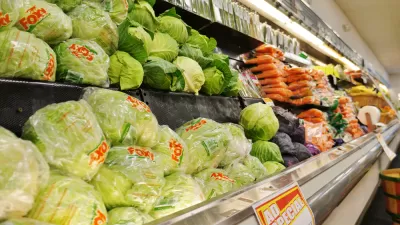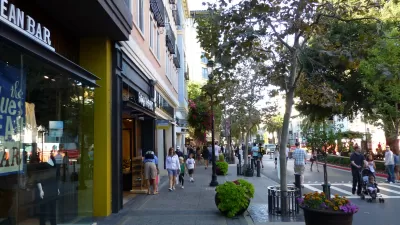Being able to get groceries without a car can be a big draw in walkable, mixed use neighborhoods. Many Boston grocers and developers are taking that to heart.

For The Boston Globe, Tim Logan reports on a proliferation of ground-level grocery stores in the city's mixed-use neighborhoods. "From the South End to Waltham, builders looking to fill their ground floors with businesses that double as amenities are teaming up with grocers who want easy access to an upscale clientele. The result: A new hybrid, something between the corner grocers of old Boston and the vast supermarkets of suburbia."
Grocery shoppers don't want a long walk, meaning a certain level of residential density must be in place. "For grocery stores, having residents upstairs provides a built-in customer base, and typically one apartment building leads to another, putting more customers within walking distance. They can anchor not just a building, but a neighborhood."
Some developers see ground-level grocery shopping as another amenity to offer prospective residents, and an essential one at that. Still, concerns remain. For instance, "the logistics of loading and unloading groceries in the early morning can be complicated when a few hundred people are sleeping upstairs." And parking is still an issue for those shoppers who do drive in.
FULL STORY: Builders offer a new perk: a very short walk to the grocery store

Alabama: Trump Terminates Settlements for Black Communities Harmed By Raw Sewage
Trump deemed the landmark civil rights agreement “illegal DEI and environmental justice policy.”

Study: Maui’s Plan to Convert Vacation Rentals to Long-Term Housing Could Cause Nearly $1 Billion Economic Loss
The plan would reduce visitor accommodation by 25% resulting in 1,900 jobs lost.

Why Should We Subsidize Public Transportation?
Many public transit agencies face financial stress due to rising costs, declining fare revenue, and declining subsidies. Transit advocates must provide a strong business case for increasing public transit funding.

Paris Bike Boom Leads to Steep Drop in Air Pollution
The French city’s air quality has improved dramatically in the past 20 years, coinciding with a growth in cycling.

Why Housing Costs More to Build in California Than in Texas
Hard costs like labor and materials combined with ‘soft’ costs such as permitting make building in the San Francisco Bay Area almost three times as costly as in Texas cities.

San Diego County Sees a Rise in Urban Coyotes
San Diego County experiences a rise in urban coyotes, as sightings become prevalent throughout its urban neighbourhoods and surrounding areas.
Urban Design for Planners 1: Software Tools
This six-course series explores essential urban design concepts using open source software and equips planners with the tools they need to participate fully in the urban design process.
Planning for Universal Design
Learn the tools for implementing Universal Design in planning regulations.
Smith Gee Studio
Alamo Area Metropolitan Planning Organization
City of Santa Clarita
Institute for Housing and Urban Development Studies (IHS)
City of Grandview
Harvard GSD Executive Education
Toledo-Lucas County Plan Commissions
Salt Lake City
NYU Wagner Graduate School of Public Service




























